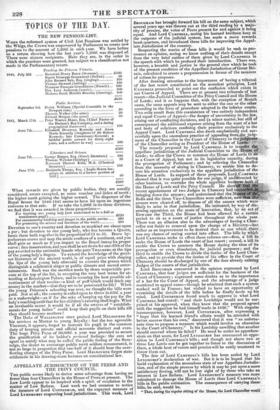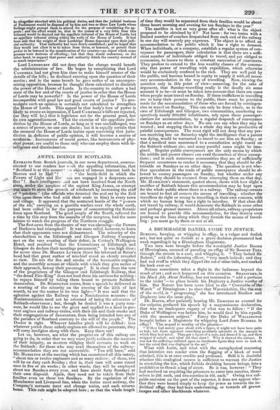APPELLATE JURISDICTION OF THE PEERS AND THE PRIVY COUNCIL.
THE public seems likely to derive some advantage from having no fewer than four Chancellors in the House of Peers at present. The Law Lords appear to be inspired with a spirit of emulation in the matter of Law Reform. Last week we had occasion to notice the measure of Lord COTTENHAM, and the expected measure of Lord LYNDHURST respecting local jurisdictions. This week, Lord BaocurrAm has brought forward his bill on the same subject, which several years ago was thrown out at the third reading by a majo- rity of proxies, the votes of Peers present for and against it being equal. And Lord CAMPBELL, seeing his learned brethren busy at the outposts of the judicial system, has made a move towards bead-quarters, and introduced three bills for improving the Appel- late Jurisdiction of the country. Respecting the merits of these bills it would be rash to pro- nounce an opinion, seeing we know nothing of their details except from the very brief outline of them given by Lord CAMPBELL in the speech with which he prefaced their introduction. There was, however, a breadth and justice in the general view which he took of the present condition of the Appellate Jurisdiction of Great Bri- taio, calculated to create a prepossession in favour of the measure of reform be proposes. After drawing attention to the importance of having a tribunal of the last resort constituted on the soundest principles, Lord CAMPBELL proceeded to point out the confusion which exists in our Courts of Appeal. There are at present two tribunals of last resort—the Judicial Committee of the Privy Council and the House of Lords ; and it so happens that, with the exception of Scotch cases, the same appeals may be sent to either the one or the other according to the form of procedure adopted in the inferior courts. Two evils result from this coexistence of two entirely independent and equal Courts of Appeal—the danger of uncertainty in the law, arising out of conflicting decisions, and (a minor matter, but still of consequence) the additional expense arising from the want of a bar and body of solicitors confining their practice exclusively to the Appeal Court. Lord CAMPBELL also dwelt emphatically and suc- cessfully upon the anomalous practice of appealing from the judg- ment of the Chancellor in the Court of Chancery to the judgment of the Chancellor acting as President of the House of Lords. • The remedy proposed by Lord CAMPBELL is to transfer the appellate jurisdiction of the Judicial Committee to the House of Lords ; to allow the Crown to summon the House of Lords to sit as a Court of Appeal, but not in its legislative capacity, during the prorogation of Parliament ; and by relieving the Chancellor from the necessity of sitting in Chancery, to enable him to de- vote his attention exclusively to the appellate jurisdiction of the House of Lords. In support of these proposals, Lord CAMPBELL showed that it was quite possible for one judge, if unclistracted by
other business, to overtake the whole appellate business both o the House of Lords and the Privy Couucil. He sho recent appointment of two Judges in Chancery had s bringing down the arrears ; and maintained that the M Rolls and the three Vice-Chancellors were sufficient, o
arrears were cleared off, to dispose of all the causes which were likely to arise in that jurisdiction. He intimated, by way of dis- arming opposition on the score of innovation, that, by an act of EDWARD the Third, the House had been allowed for a certain period to sit as a court of justice throughout the whole year. There was an allusion also to the advantages of having a Chan- cellor not liable to removal upon the change of a Ministry—but rather as an improvement to be desired than as one which there was any chance of seeing carried into effect. The bills by which Lord CAMPBELL seeks to effect these reforms are—first, a bill to make the House of Lords the court of last resort ; second, a bill to enable the Crown to summon the House during the time of its prorogation or even dissolution, for judicial purposes ; and the third to enable the Crown to divide the duties of the Lord Chan- cellor, and to provide that the duties of his office in the Court of Chancery should be discharged by one of the four already existing Judges of the courts of that jurisdiction.
Lord BROUGHAM concurred in the opinion expressed by Lerd CAMPBELL that four judges are sufficient for the business of the Court of dhancery ; expressed some doubts as to the importance of a bar for the Court of Appeal, and the advantage of a judge restricted to appeal cases—though be admitted that such a system worked well in France; but wished to have an opportunity of examining the details of the bills before he finally made up his mind. Lord CorrmarAm found much to approve in what Lord CAmpriELL had stated : "and their Lordships would not be sur- prised at his approval, when they knew that the proposal agreed with the suggestion he had himself made in 1836." With singular inconsequence, however, Lord CorTENBAsr, after. expressing a "hope that his learned friend's efforts would be_attended with better success than his own," discovered that it was "an unfortu- nate time to propose a measure which would involve an alteration in the Court of Chancery." Is his Lordship unwilling that another should succeed where be failed? He need be under no apprehen- sions on that score, for Lord LYNDHURST has announced an oppo- sition to Lord CAMPBELL'S bills ; and though not above two or three Lay Lords can be got together to listen to the discussion of them, a whole host of voters and proxies will be easily mustered to throw them out.
The fate of Lord CAMPBELL'S bills has been sealed by Lord LYNDHURST'S declaration of war. But it is to be hoped that his lucid explanation of the anomalous state of our Appellate Jurisdic- tion, and of the simple process by which it may be put upon a more satisfactory footing, will not be lost sight of by those who take an interest in Law Reform. Lord LYNDHURST'S measure was more calculated to damage the House of Lords than Lord CAMPBELL'S bills in Ihe public estimation. The consequence of carrying these. bills, be said, would be,
"That, during the regular sitting of the Rouse, the Lord Chancellor would
be altogether absorbed with his political duties, and that the judicial business of Parliament would be disposed of by him and two or three Law Lords whose feelings might prompt them to attend for the purpose of considering the ap- peals: and the effect would be, that in the course of a very little time this tribunal would be deemed not the appellate tribunal of the House of Lords, but an appellate tribunal sitting within the walls of the House of Lords. It had been said that the weight of their Lordships' House depended upon their judi- cial authority. That authority had been firmly established; and he hoped that they would not allow it to be taken from them, or lessened, or permit their power to be lowered in the consideration of the country—an object which some persons were desirous of effecting; but that they would endeavour, on the other hand, to support that power and authority which the country deemed of so much importance."
Lord LYNDHURST did not deny that the change would benefit the administration of law. He began by complaining that Lord CAMPBELL had not given him time to make himself master of the details of the bills ; he declined entering upon the question of their merits ; and in the same breath he gave notice of an uncompro- mising opposition, because he thought them calculated to diminish the power of the House of Lords. Is the country to endure a bad state of the law and of the courts of justice in order that the House of Lords may be powerful ? Is the power of the House of Lords incompatible with good law and good courts of justice ? To pro- mulgate such an opinion is certainly not calculated to strengthen the House of Lords. This appeal to that body's love of power is likely to create an impression, if Lord CAMPBELL'S bills are rejected, (as they will be,) that it legislates not for the general good, but its own aggrandizement. That the exercise of the appellate juris- diction by the House of Lords' so long as it was unchallenged, was a source of power, no one can doubt ; but it is equally certain that the moment the House of Lords insists upon exercising that juris- diction in defiance of public opinion, it will become a source of weakness. Instruments of moral power, like instruments of phy- sical power, are useful to those only who can employ them with in- telligence and discrimination.



























 Previous page
Previous page